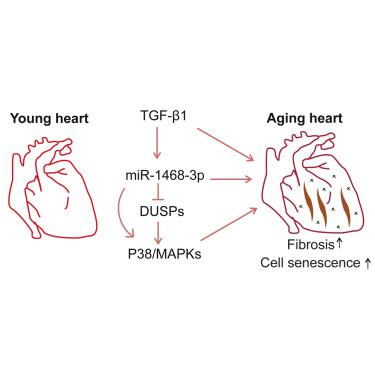Molecular Therapy - Nucleic Acids ( IF 6.5 ) Pub Date : 2020-04-08 , DOI: 10.1016/j.omtn.2020.04.001 Ruizhu Lin 1 , Lea Rahtu-Korpela 1 , Johanna Magga 2 , Johanna Ulvila 1 , Julia Swan 2 , Anna Kemppi 1 , Lasse Pakanen 3 , Katja Porvari 4 , Heikki Huikuri 5 , Juhani Junttila 6 , Risto Kerkelä 7

|
Non-coding microRNAs (miRNAs) are powerful regulators of gene expression and critically involved in cardiovascular pathophysiology. The aim of the current study was to identify miRNAs regulating cardiac fibrosis. Cardiac samples of age-matched control subjects and sudden cardiac death (SCD) victims with primary myocardial fibrosis (PMF) were subjected to miRNA profiling. Old SCD victims with PMF and healthy aged human hearts showed increased expression of miR-1468-3p. In vitro studies in human cardiac fibroblasts showed that augmenting miR-1468-3p levels induces collagen deposition and cell metabolic activity and enhances collagen 1, connective tissue growth factor, and periostin expression. In addition, miR-1468-3p promotes cellular senescence with increased senescence-associated β-galactosidase activity and increased expression of p53 and p16. AntimiR-1468-3p antagonized transforming growth factor β1 (TGF-β1)-induced collagen deposition and metabolic activity. Mechanistically, mimic-1468-3p enhanced p38 phosphorylation, while antimiR-1468-3p decreased TGF-β1-induced p38 activation and abolished p38-induced collagen deposition. RNA sequencing analysis, a computational prediction model, and qPCR analysis identified dual-specificity phosphatases (DUSPs) as miR-1468-3p target genes, and regulation of DUSP1 by miR-1468-3p was confirmed with a dual-luciferase reporter assay. In conclusion, miR-1468-3p promotes cardiac fibrosis by enhancing TGF-β1-p38 signaling. Targeting miR-1468-3p in the older population may be of therapeutic interest to reduce cardiac fibrosis.
中文翻译:

miR-1468-3p促进与衰老相关的心脏纤维化。
非编码microRNA(miRNA)是基因表达的有力调节剂,并严重参与心血管病理生理。当前研究的目的是鉴定调节心脏纤维化的miRNA。对年龄匹配的对照对象和患有原发性心肌纤维化(PMF)的心源性猝死(SCD)受害者的心脏样本进行miRNA分析。患有PMF的老SCD受害者和健康的人类心脏显示出miR-1468-3p表达增加。体外对人类心脏成纤维细胞的研究表明,增加miR-1468-3p水平可诱导胶原蛋白沉积和细胞代谢活性,并增强胶原蛋白1,结缔组织生长因子和骨膜蛋白的表达。另外,miR-1468-3p通过增加与衰老相关的β-半乳糖苷酶活性以及增加p53和p16的表达来促进细胞衰老。AntimiR-1468-3p拮抗转化生长因子β1(TGF-β1)诱导的胶原蛋白沉积和代谢活性。从机理上讲,mimic-1468-3p增强了p38的磷酸化,而antimiR-1468-3p降低了TGF-β1诱导的p38活化并消除了p38诱导的胶原蛋白沉积。RNA测序分析,计算预测模型和qPCR分析确定了双特异性磷酸酶(DUSP)为miR-1468-3p靶基因,双重荧光素酶报告基因检测证实了miR-1468-3p对DUSP1的调控。总之,miR-1468-3p通过增强TGF-β1-p38信号传导来促进心脏纤维化。在老年人群中靶向miR-1468-3p可能对减少心脏纤维化具有治疗意义。











































 京公网安备 11010802027423号
京公网安备 11010802027423号